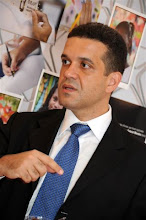Archive for December 2008
A Study of Seven countries and Brazil
INTERNATIONAL STRATEGIES FOR INNOVATION: A Study of Seven countries and Brazil
http://www.wilsoncenter.org/topics/pubs/brazil.innovation.sp.pdf
For countries seeking to build a dynamic, highly-competitive economy capable of sustainable, long-term growth, innovation—or the capacity to transform knowledge into new products and methods of production and service—has become the engine for national strategies of development. Seven of the world’s most notably innovative countries— United States, Canada, Ireland, France, United Kingdom, Finland and Japan—have recognized knowledge as a key element for improving productivity and competitiveness, as well as advancing social and economic development. Understanding how these countries have succeeded in applying policies, adapting institutions, and using economic incentives and instruments to construct knowledge-based economies was the purpose of an in-depth, ten-month research project, Mobilização Brasileira para a Inovação (Mobit – Brazilian Innovation Mobilization). Intended to translate statistics into discernable trends, identify patterns in the national innovation strategies of these seven countries, and establish guidelines of action for the Brazilian government, the Mobit project was the focus of a recent seminar coordinated by the Brazil Institute and Prospectiva International in conjunction with the Brazilian Agency for Industrial Development (ABDI).
Hosted and co-sponsored by the Institute for Advanced Studies (IEA) of the University of São Paulo on April 25, 2008, the conference featured a keynote address by the General Coordinator of the Mobit study and the Observatory for Innovation and Competitiveness, Glauco Arbix. A group of leading Brazilian researchers, economists, and public officials joined the discussion to debate the findings of the Mobit Final Report and analyze its implications for Brazil’s national innovation system. Paulo Sotero, director of the Brazil Institute, and César Ades, director of the IEA, provided introductory remarks. Participants noted that while Brazil’s innovation performance is fast improving—leading in deep-water oil exploration technology and in the production and use of renewable fuels—it is far from entering the ranks of top international innovators. This report synthesizes the findings of the Mobit study and the proceedings from the seminar.
http://www.wilsoncenter.org/topics/pubs/brazil.innovation.sp.pdf
For countries seeking to build a dynamic, highly-competitive economy capable of sustainable, long-term growth, innovation—or the capacity to transform knowledge into new products and methods of production and service—has become the engine for national strategies of development. Seven of the world’s most notably innovative countries— United States, Canada, Ireland, France, United Kingdom, Finland and Japan—have recognized knowledge as a key element for improving productivity and competitiveness, as well as advancing social and economic development. Understanding how these countries have succeeded in applying policies, adapting institutions, and using economic incentives and instruments to construct knowledge-based economies was the purpose of an in-depth, ten-month research project, Mobilização Brasileira para a Inovação (Mobit – Brazilian Innovation Mobilization). Intended to translate statistics into discernable trends, identify patterns in the national innovation strategies of these seven countries, and establish guidelines of action for the Brazilian government, the Mobit project was the focus of a recent seminar coordinated by the Brazil Institute and Prospectiva International in conjunction with the Brazilian Agency for Industrial Development (ABDI).
Hosted and co-sponsored by the Institute for Advanced Studies (IEA) of the University of São Paulo on April 25, 2008, the conference featured a keynote address by the General Coordinator of the Mobit study and the Observatory for Innovation and Competitiveness, Glauco Arbix. A group of leading Brazilian researchers, economists, and public officials joined the discussion to debate the findings of the Mobit Final Report and analyze its implications for Brazil’s national innovation system. Paulo Sotero, director of the Brazil Institute, and César Ades, director of the IEA, provided introductory remarks. Participants noted that while Brazil’s innovation performance is fast improving—leading in deep-water oil exploration technology and in the production and use of renewable fuels—it is far from entering the ranks of top international innovators. This report synthesizes the findings of the Mobit study and the proceedings from the seminar.
Sunday, December 28, 2008
Posted by Fabiano Gallindo




